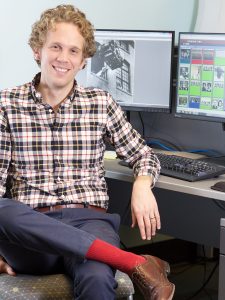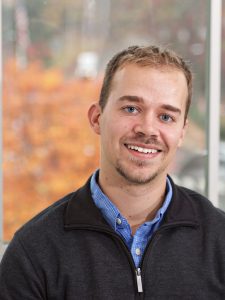The Graduate School’s annual GEAB Impact Awards have long recognized graduate students and recent graduate alumni whose research is benefiting North Carolina’s citizens and communities. Starting in 2017, The Graduate School is pleased to also present annual Horizon Awards for graduate student and recent graduate alumni research with extremely high potential for benefiting North Carolina in the future.
The Graduate School will formally present the complementary awards at the Annual Graduate Student Recognition Celebration in April. Below are two award winners for 2017 and their innovative discoveries:
GEAB Impact Award
Digitally interpreting North Carolina’s past
Elijah Gaddis, American Studies

Digital tools and shared memories can combine to make history accessible in far-reaching ways. Doctoral student Elijah Gaddis has managed digital projects that are allowing North Carolinians to learn and contribute to community history. In the “Digital Loray” project, professor Robert Allen, Ph.D., Gaddis and a team of UNC-Chapel Hill students, faculty and staff told the history of Gastonia’s Loray Mill, which was in operation from 1901 through 1993. Gaddis spent more than three years on the project, partnering with cultural heritage and community organizations and several individuals – amassing a digital collection of 2,000 items. Through a crowdsourcing tool, Gastonia residents and other visitors to the site can share their own memories.
In the “Locating Lynching” project, assistant professor Seth Kotch, Ph.D., Gaddis and about 75 undergraduates have documented the victims of lynching in North Carolina from 1865 to 1941. The undergraduates researched information on the victims’ jobs, family members and communities, and Gaddis created a map showing the location of each lynching. “This project tells the story of 147 people,” Gaddis says. “That means there are thousands of descendants and relatives who can better understand their own histories and 60 North Carolina counties whose residents are better able to account for the history of the place they live, work and raise families in.”
Gaddis and Allen co-founded the Community Histories Workshop, whose members are focused on new digital projects that help North Carolinians understand, and contribute their own memories to, community history.
Horizon Award
Analyzing cell ‘snapshots’ to better understand and treat heart disease
Joshua Welch, Computer Science

Heart disease is the second leading cause of death in North Carolina. Heart damage from injury or disease is so serious because once an adult’s beating heart muscle cells are lost, they cannot regenerate. Scar tissue builds around the damaged muscle cells, and this tissue cannot beat along with the healthy heart muscle tissue. The laboratory of UNC-Chapel Hill assistant professor Li Qian, Ph.D., has developed direct cardiac reprogramming, which can convert heart scar tissue cells back into heart muscle cells. However, only a small fraction of cells exposed to the reprogramming treatment actually become healthy again.
Scientists need a precise understanding of changes leading to successful reprogramming, and doctoral student Joshua Welch has developed a computational approach, called SLICER, that holds promise. The approach uses experimental “snapshots” of genes that are turned on within single cells during a biological process such as cardiac reprogramming. The snapshots are from different points in the process, and they are in random order. SLICER identifies the correct order and the biological changes can then be observed in the proper sequence. Welch’s team applied SLICER to experimental data from Qian’s research group – and the approach identified thousands of genes that turn on or off during cardiac reprogramming. This analysis also revealed “roadblock” genes that may explain why only a subset of cells respond to the reprogramming treatment. SLICER’s novel approach is producing insights into direct cardiac reprogramming that may ultimately improve treatment for heart disease.
